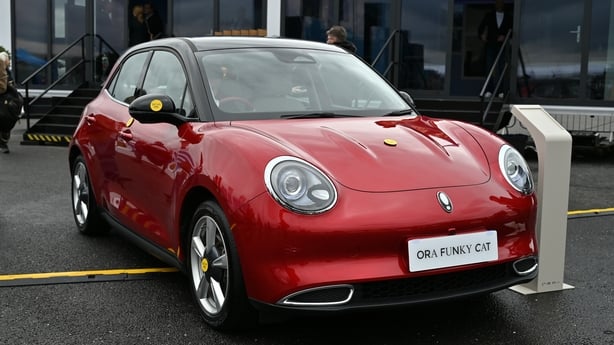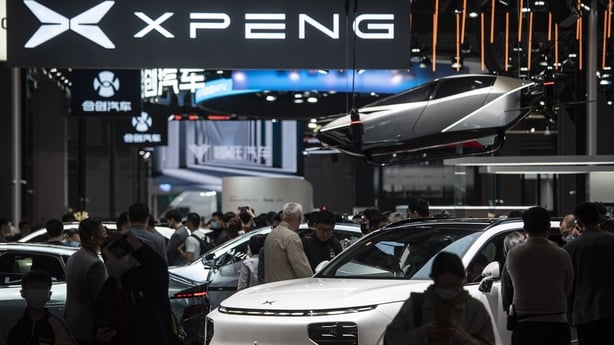The drive to deliver affordable electric vehicles is a priority for car makers and it is being accelerated by competition from China.
Electric car sales continued to surge in Ireland, according to the Society of the Irish Motor Industry, with 18,458 EVs registered in the first seven months of the year.
That is an increase of 65% on 2022.
There is demand for affordable EVs in Ireland and there is a deadline in Europe.
Petrol and diesel engines will no longer be sold in Europe by 2035 which means the demand for EVs is only going in one direction, along with the need for more affordable EVs.
"Initially, electric vehicles were for the premium brand but now it's really starting to have an impact on the family car market, so I think the next stage is the smaller car market," said Brian Cooke, Director General of SIMI.
Chinese car makers have spotted the opportunity, and it has led to an increasing number of Chinese EVs being spotted on Irish roads.
MG owners Shanghai Automotive Industry Corporation (SAIC) are expanding sales in Ireland and the UK. SAIC's MG has had an imprint on the Irish market for 18 months now, and Ora entered the market earlier this year with its Funky Cat.

BYD, possibly the biggest car brand you've never heard of, had "quite a good July for a new brand", according to SIMI.
Chinese car makers had a 9% share of Europe's EV market in 2022, nearly double the figure in 2021, according to Inovev, which has a database of the worldwide automotive market.
The rise of electric vehicles is the driving force behind China's car industry, unlike European manufacturers who have had to shift gears from combustion engines to electric.
China's EV market has grown to be the biggest in the world, using lower labour costs and local battery suppliers to get a head start over many rivals.
A week ago, Volkswagen said it will invest $700 million in Xpeng in return for a 5% stake.
The move by the German car maker will see it and the Chinese EV start-up develop two Volkswagen-branded electric cars that will roll out in 2026.
Volkswagen’s Audi brand will also work with SAIC, the Chinese state owned manufacturer, to develop EVs in China.
Throwing some shade on the Volkswagen deal, Mercedez-Benz said it was working with partners in China to adapt its technological offerings, but would not hand "the task of creating the Mercedez to another OEM (Original Equipment Manufacturer)."

On the same day that Volkswagen announced its deal with Xpeng, Renault said it was aiming to slash production costs for its electric models by 40%.
The French car maker also fears the "invasion" of cheap Chinese EVs.
Renault, like other EV makers, also faces increased pressure from US rival Tesla, which cut US prices of its Model Y by 25% to €50,490 this year.
On Thursday, BMW reported significantly higher revenues for the first half of 2023 at €74 billion, due partly to the integration of its Chinese joint venture BMW Brilliance Automotive.
BMW paid €3.7 billion to take majority control of the Chinese joint venture in February last year. It reduced its forecast for free cash flow to above €6 billion from around €7 billion previously, citing the need to build up inventories and invest more in electrification.
Mr Cooke, SIMI, thinks the European industry and other parts of the industry in Asia are starting to catch up with China.
"I think the European manufacturers have been competitive so far, and certainly while we will see more Chinese brands come in and increase their penetration of the market, I also expect to see the European car industry and the other Asian car industries like Korea and Japan come to the fore as well."
He said the momentum behind electric vehicles is well established now which will lead to more competition and a variety of price points.
"I think a lot of the brands are already signalling that they will be bringing in smaller cars and lower prices to capture another section of the market."







